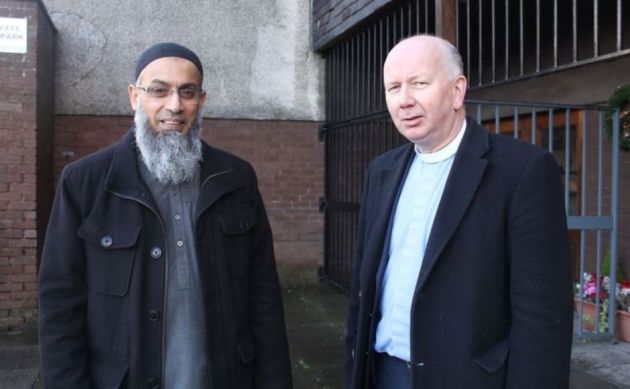'Fire attack' on Scottish Islamic center draws town's faith communities closer

The faith communities of a Scottish town have come closer together after an intentionally started fire destroyed an Islamic center in November.
The act of arson in Bishopbriggs near Glasgow had the unintended effect of acting as a unifier of the different faith communities, the Church of Scotland said.
After the Al Farooq cultural center was destroyed, in what police said was a suspected hate crime, Springfield Cambridge Parish Church offered the Muslim community a place to hold its Friday prayers.
Community leaders say the incident has led to much greater understanding between the different faith groups.
"After the firebombing attack, Christians in Bishopbriggs came together through the ecumenical group, Bishopbriggs Churches Together, to discuss what we could do to help our Muslim brothers and sisters," said Rev. Ian Taylor, minister at Springfield Cambridge Parish Church.
"We sent them a card expressing our disappointment and sorrow and asking if we could offer them temporary accommodation."
The pastor said they called and accepted. After meeting with Muslim representatives on 2 December, they agreed they will use a meeting room within Springfield Cambridge Church to hold Friday prayers.
"They started to use the room on 4 December and can stay as long they need to.
"As Christians we believe that love is stronger than hate. So we hope that some good can come out of this destructive act," said Taylor,
"By reaching out at this time of sorrow and fear we hope to build stronger relationships between Christians and Muslims in Bishopbriggs."
Shafiq Sharif, secretary of the al-Farooq education trust, thanked the minister and the congregation, saying the Muslim community had been humbled and uplifted by the offer, the (Presbyterian) Church of Scotland said on its website.
"We are really very appreciative of the support we have had from the Church of Scotland and from a lot of Christians in our community," said Sharif.
"We had managed to create a small place where we could come together as a community, and now we don't have anything at all, so the community was feeling lost."
He said that after the first gathering, "everyone was very pleased and happy."
"After the fire we got a lot of phone calls from the Christian community to offer help. We never knew that help and support was there before. So can good come from this? It has, because it has brought us closer together.
"Through this we have learned we are not alone."
About 80 families use the Bishopbriggs center, both as a mosque and as a place to gather, share community meals and teach children about their cultural heritage and traditions.
Families using the center generally have long established roots in Scotland, Sharif said, noting that his own grandfather settled in Dunbartonshire in 1930, before the subcontinent was divided into India and Pakistan.
After the Paris attacks, Police Scotland reported a spike in hate crimes, but Sharif said his community feels comfortable in Glasgow.
"Glasgow is a great place for the Muslim community who have lived here for a great number years, contributing to the wider society.
"The arson attack carried out on 17 November's was the work of a misguided individual, or individuals, who do not represent the wider community," he told the Church of Scotland.
The Islamic center will be reconstructed and may reopen as early as January.